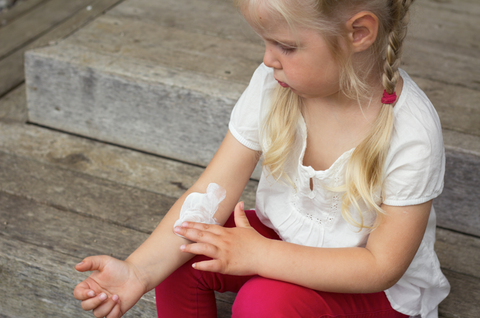Is it safe to use topical steroids on my child?

Parents often ask me whether it's okay to use topical steroids on their child's eczema. This is a difficult question to answer during a consultation as steroids can offer temporary relief to a child who may be quite distressed and/or unable to sleep because of their eczema.
So my answer is "Short-term use is fine, but if you haven't used them (yet) I suggest don't start, as they do have risks of side effects."
I know what it's like to use and rely on topical steroids. I'll confess, when I had dermatitis on my hands and face, I used cortisone cream for years as a teenager and in my early twenties. However, this over-use of topical steroids made the skin on my face thin and fragile.
And when my daughter first had eczema, I used topical steroids on her skin. It was the easy solution when I had no others options offered to me. What woke me up from my topical steroid slumber was when a nurse got mad at me and said "Has your child STILL got eczema?" She mentioned diet modifications so I began researching natural solutions for my daughter's eczema.
Here are some facts about topical steroids so you can make an informed choice:
- Babies and very young children are at risk of absorbing topically applied corticosteroids into the bloodstream, especially when these medications are very potent, applied in large quantities too frequently, used for prolonged periods of time, or used inappropriately under a diaper or other covered (occluded) area.
- When topical steroids are used improperly, there may be a risk of slowing of growth (height).
- Corticosteroids taken by mouth also are absorbed into the bloodstream. These can reduce the body’s production of natural corticosteroids, weaken immune responses and affect growth, but do not affect brain development.
- Topically applied corticosteroids used in the appropriate quantity and for the appropriate duration (see next paragraph) are unlikely to affect growth or the body’s ability to fight infections."
Now, according to the product packaging, this is what is recommended as appropriate use:
- Topical steroids should not be used for more than 7 days,
- should not be applied to broken skin [but eczema is broken skin so this looks like the manufacturer's disclaimer to avoid litigation],
- and should not be applied around the eye area, as long-term use can cause cataracts.
Unfortunately, when your child is suffering with severe itchy skin, topical steroids are often relied on for temporarily relief. This is understandable, as we all want a quick and easy solution to eczema and the itchiness and poor sleep that can result.
As a parent you need to decide what is best for your child. As a nutritionist that has worked with hundreds of eczema patients over the last decade, I recommend to my patients a more holistic approach - a nutritious diet that is specific for preventing eczema and dermatitis, the Eczema Diet. Supplements are also essential as nutritional deficiencies can cause or contribute to eczema and I prescribe Skin Friend AM and PM which I developed ten years ago for my daughter who is now eczema-free.
Click here to read The Eczema Diet >
About the author
Karen Fischer is an Australian nutritionist who specialises in eczema, and she is the author of five health books including The Eczema Diet and the award-winning book The Healthy Skin Diet. Karen has worked with hundreds of eczema patients at the Eczema Life Clinic in Sydney, Australia.
Image: stock photo from Shutterstock (note the amount of steroid cream used is usually less than this image depicts and children should not apply their own steroid cream).
